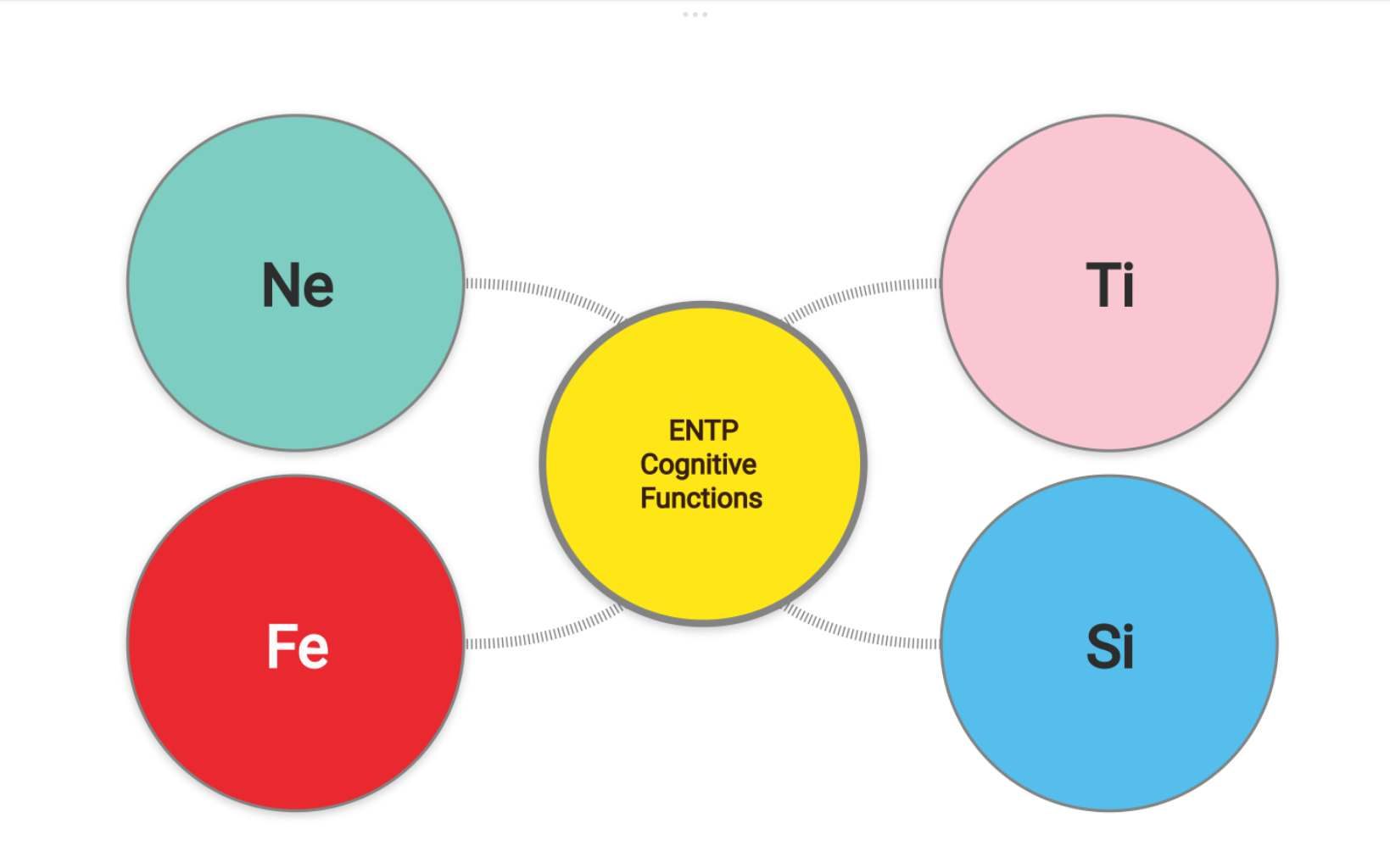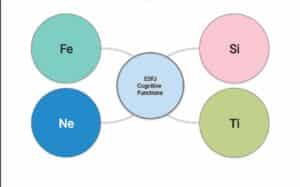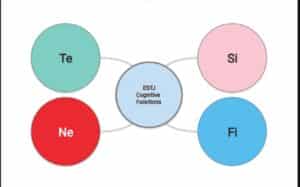Reading Time: 25 Minutes
So, you’ve heard about ENTP cognitive functions and want to know what they’re all about? Imagine your mind is like a busy workshop, where each function plays a different role to keep everything running smoothly. For ENTPs, these functions are like the gears that drive their creativity, logic, and social interactions. Understanding these functions can help you see how an ENTP’s brain works, why they think the way they do, and how they handle life’s challenges. Let’s dive into the basics so you can get a clear picture of what makes ENTPs tick.
The Four Primary Cognitive Functions of ENTPs
Let’s dive into the mind of an ENTP, where ideas are always bouncing around like popcorn in a microwave. These bright and curious personalities operate using four main cognitive functions that shape how they think, feel, and act. I’ll break it down for you in the simplest terms, with a dash of humor, because, let’s be honest, this stuff can get dry without a little fun.

1. Dominant Function: Extraverted Intuition (Ne)
Imagine your brain is a never-ending fireworks display, with ideas shooting off in all directions. That’s what Extraverted Intuition, or Ne, feels like for an ENTP. This function is all about connecting dots that most people don’t even see. ENTPs love to explore possibilities, dream up wild ideas, and brainstorm solutions that might sound crazy at first but often turn out to be pure genius.
Ne keeps ENTPs constantly curious and ready to chase after the next big thing. They’re like detectives, but instead of solving crimes, they’re solving the mysteries of life, coming up with inventive ways to tackle problems, or just figuring out how to make life more interesting. The downside? Sometimes, they chase so many rabbits that they forget where they started. But hey, life’s an adventure, right?
2. Auxiliary Function: Introverted Thinking (Ti)
Now, let’s talk about Introverted Thinking, or Ti, which is like the ENTP’s internal sorting hat. While Ne is busy throwing ideas around like confetti, Ti steps in to ask, “Does this actually make sense?” Ti loves to analyze and break things down into smaller pieces to see how they fit together logically. It’s the reason ENTPs can be so good at debate or solving complex problems—they don’t just accept things at face value; they dig deeper.
Ti is like that friend who always double-checks the bill at a restaurant to make sure everyone’s paying their fair share. It’s precise, thorough, and sometimes a little too nitpicky. But without it, ENTPs would be all over the place, lost in a sea of ideas with no anchor to keep them grounded. Ti helps them turn those wild ideas into something workable, ensuring they’re not just all talk but can actually walk the walk.
3. Tertiary Function: Extraverted Feeling (Fe)
Extraverted Feeling, or Fe, is where things get a bit tricky for ENTPs. Fe is all about understanding and managing emotions—both their own and others’. For ENTPs, this function is like that app on your phone you rarely use but occasionally comes in handy. It helps them navigate social situations and build relationships, even if they’d rather be inventing the next big thing.
Fe nudges ENTPs to consider how their words and actions affect others. It’s the little voice in their head reminding them that, while their latest idea to revolutionize the workplace is brilliant, maybe they should tone down the sarcasm when pitching it to their boss. ENTPs aren’t naturally in tune with emotions, but when they do tap into Fe, they can be surprisingly empathetic and even charming. The trick is getting them to remember it’s there before they’ve accidentally offended half the room.
4. Inferior Function: Introverted Sensing (Si)
Finally, we have Introverted Sensing, or Si, which is kind of like an old photo album in the back of the closet. Si is responsible for memories, traditions, and the comfort of routine. For ENTPs, this function is a bit of a frenemy. They’re not big fans of sticking to the past or doing things “the way they’ve always been done,” but Si is there to remind them that sometimes, it’s good to have a little structure.
Si helps ENTPs remember important details, like birthdays or the fact that their latest idea might have been tried before (and failed miserably). It’s the function that brings a bit of reality into their otherwise future-focused minds. However, ENTPs can struggle with Si, often feeling bogged down by details or frustrated by the idea of following the rules. But when they learn to appreciate Si, they realize that a little bit of the past can help ground their visionary ideas in something solid.
You Might Like To Read: ENFP Cognitive Functions (Ne, Fi, Te, Si): 4 Functions Explained in Very Simple Manner
The 4 ENTP Shadow Functions
Let’s take a journey into the darker side of the ENTP mind—the shadow functions. Now, before you get nervous, think of these as the quirky sidekicks who sometimes show up uninvited to the party. They’re not always easy to handle, and they can stir up some trouble, but understanding them can help you navigate those trickier moments in life. So, let’s meet these shadowy characters, one by one.
1. Opposing Role: Introverted Intuition (Ni)
First up, we’ve got Introverted Intuition, or Ni. Imagine Ni as that mysterious person who’s always lurking in the background, dropping cryptic hints and making you second-guess everything. While the ENTP’s dominant Ne is all about exploring endless possibilities, Ni is the opposite—it likes to focus on one single path, predicting the future like some kind of psychic detective.
For ENTPs, Ni can feel like that one friend who insists they know what’s going to happen, even if it doesn’t make sense. It occasionally pops up and says, “Hey, maybe you should focus on just one idea for a change.” But let’s be real—ENTPs don’t love being told to settle down. Ni can sometimes cause a bit of anxiety by making ENTPs worry that they’re missing out on “the right” path. It’s like when you’re watching a TV show and someone keeps telling you, “Just wait, it’s going to get good.” It might be right, but it’s also kind of annoying.
2. Critical Parent: Extraverted Thinking (Te)
Next, we have Extraverted Thinking, or Te. Think of Te as that overly strict parent who always points out what you’re doing wrong. When ENTPs are under stress, Te can show up and start barking orders like a drill sergeant. “Why aren’t you being more efficient?” it demands. “Stop messing around and get things done already!”
Te is all about structure, organization, and getting things done the right way. For ENTPs, who usually prefer a more freewheeling approach, Te can feel like an unwelcome taskmaster. It’s the voice in their head that criticizes them for not being productive enough or for not following a clear plan. But here’s the twist—while Te can be a bit of a bully, it also pushes ENTPs to be more disciplined when they really need it. So, while it might feel harsh, sometimes a little tough love is exactly what an ENTP needs to get back on track.
3. Trickster: Introverted Feeling (Fi)
Now we come to Introverted Feeling, or Fi, the Trickster. This function is like that prankster friend who loves to shake things up, but you’re never quite sure if they’re being serious or just messing with you. Fi is all about personal values and inner feelings, which can be a bit of a puzzle for ENTPs, who usually focus more on logic and ideas.
When Fi shows up, it can make ENTPs suddenly question their own motives or feel an unexpected wave of emotion. It’s like a pop quiz on your deepest values that you didn’t study for. Fi can create inner conflict, making ENTPs wonder, “Wait, do I really believe that, or am I just saying it because it sounds good?” It’s a tricky game because ENTPs aren’t always in tune with their feelings, so when Fi steps in, it can be a bit unsettling. But every so often, Fi helps ENTPs tap into their true selves, reminding them that it’s okay to care deeply about something, even if they don’t always show it.
4. Demon: Extraverted Sensing (Se)
Last but definitely not least, we have Extraverted Sensing, or Se—the Demon. Now, don’t get too spooked by the name. Se isn’t actually evil, but it can be a real troublemaker for ENTPs. Se is all about living in the moment, experiencing life through your senses, and being aware of the here and now. For ENTPs, who often live in the world of ideas and possibilities, Se can feel overwhelming and chaotic.
When Se takes over, ENTPs might suddenly feel the urge to be impulsive or reckless—like they’ve got to experience everything right now. It’s the reason an ENTP might suddenly decide to go skydiving on a whim, or completely ignore practical details like paying the bills. Se can drag them out of their mental world and drop them into the wildness of the physical world, which can be both exhilarating and terrifying.
But here’s the thing: Se also has its perks. When ENTPs learn to embrace it (without letting it run wild), Se can help them be more present, enjoy the moment, and pay attention to the little things in life. It’s about finding a balance between dreaming big and living in the now, even if that balance sometimes feels like a tightrope walk.
The Interaction of ENTP Cognitive Functions in Daily Life
Let’s talk about how ENTPs use their cognitive functions in everyday life. Picture an ENTP’s mind as a lively, bustling workshop where each function has its own job, but they all need to work together to keep the whole place running smoothly.
At the center of it all is Extraverted Intuition (Ne), the creative genius who’s constantly coming up with new ideas. It’s like a popcorn machine, always popping out thoughts and possibilities. Ne loves exploring, whether it’s brainstorming a million-dollar idea or finding a new way to solve an old problem. But Ne isn’t very good at deciding which idea is actually worth pursuing—that’s where Introverted Thinking (Ti) comes in.
Ti is the logical thinker, the one who carefully examines each idea to see if it holds up under scrutiny. It’s like the quality control department, making sure that the ideas Ne produces aren’t just wild dreams but actually make sense. Ti helps the ENTP avoid running off in every direction at once by focusing on what’s logical and practical.
Now, enter Extraverted Feeling (Fe), the social director of this operation. Fe is all about connecting with others and understanding social dynamics. In daily life, Fe helps the ENTP navigate conversations, making sure they don’t accidentally offend someone with their sharp wit or endless debating. Fe nudges them to consider how their words and actions affect others, which is crucial because ENTPs can sometimes get so wrapped up in their ideas that they forget about people’s feelings.
Finally, there’s Introverted Sensing (Si), the one who keeps track of past experiences and details. Si is like the office historian, reminding the ENTP of what’s worked before and what hasn’t. It’s not the ENTP’s favorite function—they’d much rather forge ahead into the future than dwell on the past—but Si is there to make sure they don’t keep repeating the same mistakes. Si also helps them remember important things, like how their last-minute approach to a project might have caused some stress last time.
When these functions work together, the ENTP becomes a powerhouse of creativity, logic, social savvy, and (sometimes) a bit of practicality. The trick is getting them all to play nicely together, which can be a bit like herding cats—but when it works, it’s a beautiful thing.
Strengths and Weaknesses of ENTP Cognitive Functions
Let’s break down the strengths and weaknesses of these functions, so you can get a clear picture of what makes ENTPs tick.
Strengths Of ENTP Cognitive Functions
1. Creative Problem-Solving: Thanks to Ne, ENTPs are masters at coming up with innovative solutions. They can see connections and possibilities that others might miss, making them great at thinking outside the box. Whether it’s finding a new way to market a product or coming up with a clever argument in a debate, their creativity is one of their biggest assets.
2. Logical Analysis: Ti gives ENTPs a sharp, analytical mind. They love digging into problems, breaking them down, and figuring out how things work. This logical approach helps them refine their ideas, ensuring that their creativity is backed up by solid reasoning. It’s like having a built-in fact-checker that keeps them grounded.
3. Social Adaptability: Fe helps ENTPs get along with others and adapt to different social situations. While they might not be the most touchy-feely people, they do know how to charm a crowd or navigate a tricky conversation. Fe allows them to connect with others, making them effective communicators and sometimes even leaders.
4. Broad Perspective: With Si in the mix, ENTPs can draw on their past experiences to inform their decisions. While they prefer to look forward, Si helps them remember what’s worked (and what hasn’t), giving them a broader perspective. This can help them avoid repeating mistakes and build on past successes.
Weaknesses Of ENTP Cognitive Functions
1. Overwhelm from Too Many Ideas: Ne’s constant flow of ideas can sometimes be more of a curse than a blessing. ENTPs can get overwhelmed by their own creativity, struggling to focus on just one thing. It’s like having too many tabs open on your browser—exciting, but also a bit chaotic. They might start lots of projects but finish fewer, simply because they keep getting distracted by the next shiny idea.
2. Over-Critical Nature: Ti can make ENTPs a bit too critical, both of themselves and others. Their logical mind always wants to poke holes in arguments, which can sometimes come off as nitpicking or being overly skeptical. This can strain relationships, especially when others just want a bit of emotional support instead of a detailed analysis.
3. Social Missteps: While Fe helps them connect with others, ENTPs can sometimes miss the mark socially. They might be so caught up in their ideas that they forget to consider how others feel, leading to awkward or even hurtful interactions. They can also struggle with emotional expression, finding it easier to talk about ideas than feelings.
4. Resistance to Routine: Si can feel like a wet blanket to ENTPs, who prefer novelty over routine. They might resist following established procedures or traditions, which can lead to a lack of consistency. While they’re great at innovation, they might struggle with tasks that require sticking to a plan or following through on details.
The Developmental Path of ENTP Cognitive Functions
Let’s take a stroll down memory lane and look at how the ENTP’s cognitive functions develop over time. Think of this as the ENTP growing up, with each function playing its part at different stages of life. It’s like watching a superhero origin story, where each power comes into play at just the right moment.
Childhood: Extraverted Intuition (Ne) Takes the Lead
In the early years, Extraverted Intuition (Ne) is the star of the show. Picture a curious kid who’s always asking “What if?” and “Why not?”—that’s Ne in action. ENTPs as children are little explorers, constantly seeking out new experiences, ideas, and possibilities. They’re the ones who’ll take apart the toaster just to see how it works, or come up with wild stories that combine dinosaurs with outer space. Ne is all about imagining what could be, and in childhood, it’s in full swing.
However, this freewheeling imagination needs some grounding, which leads us to the next stage.
Adolescence: Introverted Thinking (Ti) Steps Up
As ENTPs move into their teenage years, Introverted Thinking (Ti) starts to develop more fully. It’s like the arrival of a voice of reason in the middle of all that creative chaos. Ti begins to analyze and question everything, making sure that those wild ideas from Ne actually make sense. This is when ENTPs start to get really good at debating, picking apart arguments, and understanding how things work on a deeper level.
Ti gives them the ability to dig into concepts and see the logic behind the ideas. It’s not just about imagining new possibilities anymore—it’s about making sure those possibilities are grounded in reality. For the ENTP, adolescence is a time of honing their logical skills, even if they still love to play with big ideas.
Adulthood: Extraverted Feeling (Fe) Finds Its Place
In adulthood, Extraverted Feeling (Fe) starts to come into its own. Up until this point, ENTPs might have been a bit rough around the edges when it comes to social interactions. But as they grow, Fe begins to help them better understand and navigate the feelings of others. It’s like they finally start to realize that people aren’t just walking, talking ideas—they have emotions too!
Fe helps ENTPs become more empathetic and socially aware. They learn to soften their approach, knowing when to dial back the debate and offer a bit of support instead. While they’ll always love a good argument, Fe helps them balance their intellectual pursuits with a little more warmth and understanding in their relationships.
Maturity: Introverted Sensing (Si) Balances the Equation
Finally, in the later stages of life, Introverted Sensing (Si) begins to play a more significant role. By this point, ENTPs have experienced a lot, and Si helps them draw on these past experiences to make more informed decisions. It’s like the voice of wisdom that says, “Hey, remember that time when this approach didn’t work out so well? Maybe try something different this time.”
Si might feel a bit out of character for the ENTP, who loves to blaze new trails, but it’s an essential part of their development. It helps them slow down, reflect, and appreciate the lessons they’ve learned along the way. In maturity, ENTPs find that they can still innovate and explore, but now they do it with a bit more caution and insight.
How to Develop and Strengthen ENTP Cognitive Functions
So, now that we’ve covered the developmental path, let’s talk about how ENTPs can continue to grow and strengthen their cognitive functions. Think of this as a workout plan for the mind—because even superheroes need to stay in shape!
1. Nurture Your Ne: Embrace Curiosity
For ENTPs, Ne is like a muscle that’s already naturally strong, but it can always get stronger. The best way to nurture Ne is to stay curious. Keep exploring new ideas, hobbies, and interests. Travel, read widely, and engage in conversations with people who have different perspectives. The more you feed your curiosity, the sharper your Ne will become.
However, remember not to let it run wild. While it’s fun to chase after every new idea, try to balance that with some focus. Pick a few projects that really excite you and see them through to completion. This will help you harness Ne’s creativity in a more productive way.
2. Sharpen Your Ti: Practice Critical Thinking
Ti is all about logical analysis, so the best way to strengthen it is through practice. Engage in activities that challenge your reasoning skills, like solving puzzles, learning new technical skills, or even taking up a challenging hobby like coding or chess. Debating with friends or writing out your thoughts in a journal can also help you refine your ability to break down and analyze ideas.
Just be careful not to overdo it. Ti can sometimes make you overly critical, so balance your analytical side with a bit of kindness—towards yourself and others. Remember, not every idea needs to be picked apart; sometimes it’s okay to just let things be.
3. Enhance Your Fe: Build Emotional Awareness
To develop Fe, start by paying more attention to the people around you. Practice active listening, where you really focus on what others are saying, rather than just thinking about your response. Try to pick up on nonverbal cues like body language and tone of voice, which can give you insight into how someone is feeling.
You can also work on expressing your own emotions more openly. Share your thoughts and feelings with those close to you, even if it feels a bit awkward at first. The more you practice, the more comfortable you’ll become with navigating the emotional landscape.
4. Strengthen Your Si: Reflect on the Past
Si might not be the ENTP’s favorite function, but it’s crucial for balance. To strengthen Si, take time to reflect on your past experiences. Keep a journal where you write about what worked and what didn’t in different situations. This can help you learn from your history and make better decisions in the future.
You can also try grounding exercises, like mindfulness or simply enjoying familiar routines. While novelty is exciting, there’s value in appreciating the comfort of the known. By developing Si, you’ll find that you can innovate without completely losing touch with reality.
Conclusion On ENTP Cognitive Functions
By now, you’ve got a good grasp of how ENTP cognitive functions operate, from the wild creativity of Ne to the logical precision of Ti, the social savvy of Fe, and the steadying influence of Si. These functions shape everything ENTPs do, helping them navigate the world in their unique, often unpredictable way. Whether you’re an ENTP yourself or just trying to understand one, knowing how these cognitive functions work gives you a deeper insight into their strengths, quirks, and the fascinating way their minds operate.
If you like the post, then please don’t forget to share with your friends.
Some Of The Previous Posts




